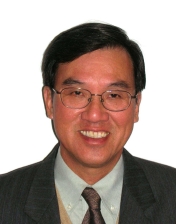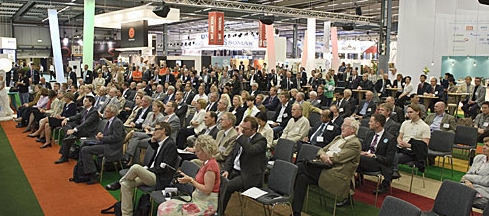Ian Melin-Jones
Ashland to Acquire International Specialty Products Inc. (ISP)
Ashland Inc. and International Specialty Products Inc. (ISP) today announced that Ashland has agreed to acquire privately owned ISP, a global specialty chemical manufacturer of innovative functional ingredients and technologies. Under the terms of the stock purchase agreement, Ashland will pay approximately $3.2 billion for the business in an all-cash transaction. At closing, ISP's advanced product portfolio will expand Ashland's position in high-growth markets such as personal care, pharmaceutical and energy. For the 12 months ended March 31, 2011, ISP generated sales of approximately $1.6 billion and earnings before interest, taxes, depreciation and amortization (EBITDA) of approximately $360 million. The transaction is expected to be immediately accretive to Ashland's earnings per share.
ISP is a leading global supplier of specialty chemicals and performance enhancing products for consumer and industrial markets. Through its unique offerings, ISP will bring high-value water soluble polymers and other advanced technologies into Ashland's functional ingredients business, as well as complementary additives for Ashland's food and beverage, energy, coatings, adhesives and water treatment markets. The acquisition is expected to significantly strengthen Ashland's functional ingredients active patent portfolio and its team of research and development scientists. The result will be a stronger, global functional ingredients business with proven technological and application capabilities to solve customers' unique formulation challenges.
Ashland Chairman and Chief Executive Officer James J. O'Brien said, "This defining transaction enables us to significantly expand our market positions in higher margin, higher growth and less cyclical global markets like personal care and pharmaceuticals. It broadens Ashland's presence within attractive growth areas like skin, hair and oral care, which are large and fast-growing segments of the $5-billion-plus personal care specialty ingredients market. In addition, we expect to more than double the size of our highest-margin functional ingredients business."
ISP President and Chief Executive Officer Sunil Kumar said, "We are very enthusiastic about the opportunity to combine ISP with Ashland. Both companies have a strong commitment to serving customers with innovative solutions and technologies. We appreciate Ashland's passion for this business and we believe this combination offers tremendous potential for our customers, key business partners and employees."
O'Brien added, "We look forward to welcoming ISP's employees to Ashland. Our business models are complementary and we share common capabilities in formulation, application development and polymerization. We are disciplined in the underlying processes and operations that enable us to manufacture best-in-class products. Given the quality of leadership within both businesses and our success with the integration of prior acquisitions, we are confident we will achieve a smooth transition to a combined company. We are excited about the opportunities for innovation and growth that lie ahead of us."
Transaction Details
On a pro forma basis giving effect to the transaction, Ashland would have had combined revenue for the 12 months ended March 31, 2011, of approximately $7.6 billion, with nearly half of revenues generated outside North America. The newly combined functional ingredients business is expected to contribute roughly half of Ashland's $1.1-billion pro forma EBITDA.
Ashland expects to realize annualized run-rate cost savings of approximately $50 million by the second year following the transaction's close through eliminating redundancies and capturing operational efficiencies.
The transaction, which is expected to close prior to the end of the September quarter, is subject to satisfaction of customary closing conditions and receipt of U.S. and European Union regulatory approvals. The purchase price will be subject to post-closing adjustments for changes in net working capital and certain other items. The transaction will be funded through a combination of cash on hand and committed financing from Citi, The Bank of Nova Scotia, BofA Merrill Lynch and U.S. Bank National Association, subject to customary terms and conditions.
Under the terms of the stock purchase agreement, if the financing is not available and the other conditions to closing are satisfied, ISP has the right to terminate the agreement and require Ashland to pay a fee of $413 million.
BofA Merrill Lynch acted as financial advisor, and Cravath, Swaine & Moore LLP acted as legal counsel, to Ashland. Moelis & Company acted as financial advisor, and Sullivan and Cromwell LLP acted as legal counsel, to ISP.
Conference Call and Webcast
Ashland will provide a live conference call and webcast with securities analysts today at 9 a.m. EDT to discuss the transaction and a presentation will be made available shortly before the event. Investors, the news media and others may access the live event through Ashland's website at http://investor.ashland.com. Following the live event, an archived version of the webcast and supporting materials will be available for 12 months.
TH Lim appointed Asian Pacific Sales Manager for BTG Instruments
 BTG is pleased to announce that effective May 13, 2011 Mr. Thong Hiang Lim has assumed the role of Regional Sales Manager, BTG Instruments ASPAC.
BTG is pleased to announce that effective May 13, 2011 Mr. Thong Hiang Lim has assumed the role of Regional Sales Manager, BTG Instruments ASPAC.
Mr. Lim graduated from Singapore Nanyang University with a BSc in mathematics and received an MSc in computing and control engineering from Bradford University, UK. He joined the BTG group with a 30-year working experience in process control and instrumentation and has brought with him expert knowledge in sales management of various instrument and control system businesses throughout the Asia Pacific region.
Mr. Lim is located in Singapore and takes overall responsibility for BTG Instruments in the ASPAC region, excluding Japan.
Lydia Bley
General Manager Instruments
Stora Enso makes a groundbreaking investment in nanotechnology at Imatra, Finland
Microfibrillated cellulose (MFC) pre-commercial plant offers lighter and stronger materials for renewable packaging and potential future applications
 Stora Enso is taking a significant step forward in renewable materials innovation by building a pre-commercial plant at Imatra in Finland for the production of microfibrillated cellulose. The new type of renewable material will be used in existing and new unique fibre-based paper and board products, barrier materials, and other potential future applications.
Stora Enso is taking a significant step forward in renewable materials innovation by building a pre-commercial plant at Imatra in Finland for the production of microfibrillated cellulose. The new type of renewable material will be used in existing and new unique fibre-based paper and board products, barrier materials, and other potential future applications.
“The MFC pre-commercial plant is another proof point of rethinking within Stora Enso. It is not only an example of pathfinding innovation together with institutions and universities for the benefit of consumers and even the planet; it is also a proof point of Stora Enso’s commitment to accelerating the development of the next generation of renewable materials. With MFC we will be able to develop lighter, stronger renewable packaging materials, a lot more with a lot less. The pre-commercial plant will put us into a unique position to accelerate customer-driven innovation and product concepts from this technology. In the longer term, as we continue to renew and challenge ourselves, the applications of this renewable material may well extend to replacing today’s fossil-based materials such as plastics and some speciality chemicals, and aluminium – revolution instead of evolution,” says Stora Enso CEO Jouko Karvinen.
The microfibrillated cellulose technology project, including the Imatra pre-commercial plant, is estimated to total approximately EUR 10 million. The plant is scheduled to start production by the end of 2011.
Equipped for future refining
In recent years, research has shown that refining is highly significant in terms of the strength properties of paper. Here at Innventia, we have a wide range of refining equipment for everything from laboratory-scale trials to full-scale trials.
In Innventia’s research projects, PFI mills – which can refine at the minimum 30 g – are often used for initial trials to evaluate factors such as a fibre’s strength potential. The pilot facility also includes full-size refiners for pilot trials. The intermediate stage now includes Innventia’s Voith refiner (1.7-2.1 kg pulp) for refining under more industrial-like conditions, but with smaller quantities. This can be used when refining large quantities of pulp is undesirable, but where researchers still want to carry out trials under industrial-like conditions. Chemical Pulp is an Innventia research cluster in which the Voith mill is used to evaluate more industrial-like refining.
Marie Bäckström, head of the Fibre Engineering group at Innventia, believes that the Voith refiner has a definite place:
“At the Voith refiner, we can look at different refining fillings and different fibre raw materials. The equipment is highly flexible, and besides traditional applications can also be used for refining mechanical pulp and carrying out studies using deionised water.”
Innventia has also constructed a refining loop next to the FEX pilot facility, which offers a whole range of different testing opportunities using industrial refiners. The effect of different fillings, pulps and pulps mixtures, flow conditions, chemical environment are just some of the process conditions that can be studied.

“We’ve worked long and hard with refining here at Innventia,” continues Marie. “For example, we’ve developed a new concept for LC-refining of mechanical pulp that has now been implemented at a large Swedish mill. With our ultramodern stock preparation system, we hope to be able to help our customers to create additional future concepts.”
The future of maintenance is here today – the first remote service products from Konecranes are now available.
Remote services are one of the newest innovations in Konecranes service business. Based on a remote connection we are able to help our customers to improve the safe use of their equipment, provide the right maintenance at the right time and asses the lifecycle of crane components.
The TRUVIEW remote data monitoring and reporting service provides the customer with a true view of their crane’s operating condition through continuous data collection. For the customer this means improved safety and higher efficiency as crane maintenance can be planned according to the crane’s actual usage and condition. TRUVIEW collects usage data from the crane through a remote connection and compiles that information into a customer report that is available for the customer at their dedicated online customer portal. The portal offers easy access to the history data of the crane with important crane specific key figures in real time.
Through the power of information, TRUVIEW offers three distinct benefits for the customer. One, it helps the customer to increase safety as overloads, emergency stops and other safety issues are captured and clearly brought to customer’s attention. Second, it enables the right maintenance at the right time based on real crane usage and condition. Third, the customer is able to see how the hoist is actually used and thus can plan and budget maintenance actions in advance.
TRUCARE is a 5-year full service contract built around the TRUVIEW service. With a fixed cost, the customer gets the full service portfolio including maintenance and inspections, wearing parts, troubleshooting, spare parts and repairs. With TRUCARE the customer doesn’t suffer from surprising extra costs and can focus on its core business since the cranes are taken care of by Konecranes.
These two new service products belong to the TRUCONNECT remote services product family which was introduced at the beginning of May. Currently TRUVIEW and TRUCARE services are available for industrial cranes, but TRUVIEW solutions for other equipment will follow soon.
Restoration of Nippon Paper Industries Ishinomaki Mill
Our major subsidiary, Nippon Paper Industries Co., Ltd. (President: YoshioHaga), has been deeply committed to the restoration of the Ishinomaki Mill (Ishinomaki, Miyagi), which was damaged in the Tohoku-Pacific Ocean Earthquake, and we are pleased to announce that its reopening is imminent.
After restoring the privately owned electrical power facility, which is the source of the power in the mill, by August, Nippon Paper Industries will restart the production of printing and publication paper by the end of September. The company is planning to fully restore the major paper machines this year.
Moreover, while determining the supply and demand balance going forward, we will be studying the production system to maximize profits. The associated plan will be announced as soon as it takes concrete form.
ITC India Orders Two Sheeters from MarquipWardUnited
ITC is one of India's foremost private sector companies with a market capitalization of more than $30 billion and a turnover of $6 billion. ITC is rated among the World's Best Big Companies, Asia's “Fab 50” and the World's Most Reputable Companies by Forbes magazine.
ITC’s Paperboard and Specialty Paper Division (PSPD) operates India's largest integrated pulping and paperboard manufacturing unit in Bhadrachalam, with a total manufacturing capacity of more than 350,000 tons of papers and paperboards per annum. ITC-PSPD is currently executing a capacity expansion project of 100,000 TPA.

After extensive market research and fact-finding visits to many sheeting facilities for this project, ITC-PSPD chose MarquipWardUnited as its preferred sheeting technology partner. MarquipWardUnited is a division of Barry-Wehmiller Companies, Inc., a $1 billion global provider of manufacturing equipment solutions and the largest packaging machinery group in the Western Hemisphere.
It was decided that a partnership between the two companies would provide ITC with the sheeters needed to improve both performance and quality. Both ITC and MarquipWardUnited see this order as the first step in a long and mutually beneficial relationship.
Two MarquipWardUnited SheetWizard sheeters equipped to produce dust-free, press-ready sheets running with one or two reels were specified to meet the exact needs of ITC and to accommodate the growing quality demands of India printers and folding carton manufacturers. With more modern high-speed presses being installed in India, only sheets cut to the tightest tolerances will allow the printer to reach the maximum output potential.
“We have been trying for some time to enter the Indian paper and board mill market,” explained MarquipWardUnited area sales manager Michael Gennis. “In ITC, we have found a superior partner for this first success.”
Rakesh Gupta, ITC General Manager – Projects, commented, “From the unique MarquipWardUnited technology, we are expecting a high output as well as excellent cutting quality and cutting accuracy, combined with a reduced power consumption of 50 percent compared to sheeters from other suppliers.”
Vacon inaugurates new factory in China
The global AC drives manufacturer Vacon inaugurated their new factory in Suzhou on 11 May 2011. Present at the inauguration ceremony were Consul General of Finland in Shanghai Mr Matti Heimonen, Vice Chairman of Suzhou Industrial Park Administrative Committee Ms Sun Yanyan, members of Vacon's Board of Directors and management team, and Vacon partners from the Asia-Pacific region.
Built to meet the company's growth targets, the new factory occupies a total area of 24,000 square meters. The new plant also has a R&D lab and the after-sales service center for the Asia-Pacific region.
At the ceremony, Mr Jan Inborr, Chairman of Vacon's Board of Directors, and Mr Pertti Rajamäki, Managing Director of Vacon's subsidiary in China, outlined Vacon's future prospects.
"This investment significantly increases Vacon's manufacturing capacity in China," said Mr Inborr. "The new plant will significantly improve our ability to meet the increasing demands from our customers and further strengthen our company and its competitiveness," he added.
Said Mr Rajamäki, "Blue skies and a white building - let them symbol the Vacon brand also here in China and remind everyone of us that our aim is to improve energy-efficiency and to reduce carbon dioxide emissions."
Vacon's subsidiary in China was established in 2003. The company focuses on providing quality AC drives solutions for the local market and helps the Chinese enterprises and society to become highly efficient in the utilization of energy and control of CO2 emissions.
Global Forest Industry CEOs See Positive Future
 Forest products industry CEOs from around the world see an important opportunity ahead as a more competitive and significantly transformed industry emerges from the recent global economic downturn. This assessment came at the conclusion of International Council of Forest and Paper Associations’ (ICFPA) 5th Global CEO Roundtable, a meeting of industry leaders from around the world which took place today in Montreal, Canada.
Forest products industry CEOs from around the world see an important opportunity ahead as a more competitive and significantly transformed industry emerges from the recent global economic downturn. This assessment came at the conclusion of International Council of Forest and Paper Associations’ (ICFPA) 5th Global CEO Roundtable, a meeting of industry leaders from around the world which took place today in Montreal, Canada.
“Coming out of today’s discussion there is a clear consensus that industry leaders are seeing positive signs that the forest products industry is emerging from the economic downturn and remains committed to improving its productivity, sustainability and innovation,” said Roundtable Co-Chair, Brad Thorlakson, President and CEO, Tolko Industries (Canada). “CEOs from around the world cited significant productivity improvements the industry undertook during the global recession, increased globalization of trade, emergence of new markets and greatly improved environmental performance as key factors that have led to a return to strength of the industry’s core product lines of pulp, paper and lumber.”
CEO’s noted recent market trends including increases in the interdependence of global supply chains and the growing levels of government intervention in the industry and economies more broadly. Accordingly, industry leaders underlined the importance of free trade and less government intervention as being essential to the growth of jobs in the sector.
“Building on the industry’s leaner structure and cost containment measures, industry leaders pointed to the significant bio-economy opportunity that will help accelerate the industry’s recovery.” added Berry Wiersum, President and CEO, SAPPI Paper Europe and Roundtable Co-Chair. “With productive government policy frameworks, strategic industry investments and partners, the forest products industry will be able to integrate emerging bio-economy opportunities with the traditional lines of pulp, paper and lumber products and move aggressively into the bio-product/bio-energy economy where jobs and environmental performance intersect.”
The global forest products industry contributes more than US$ 470 billion annually to global GDP and employs over 14 million people in almost every country in the world.
The International Council of Forest and Paper Associations’ (ICFPA) membership includes the trade associations of 43 countries. Members represent industries accounting for more than 90 percent of the world’s paper and more than 50 percent of the world’s wood production. The ICFPA is committed to the principles of sustainable development and to working with other stakeholders to ensure that environmental, social and economic benefits of our natural resources are available to current and future generations. ICFPA Members are committed to legal, certified forestry and procurement practices.
SPCI maintains its position as the world’s leading pulp and paper event
SPCI 2011, held in Stockholm, Sweden, May 17-19, gathered 650 exhibiting companies from 30 countries in 230 stands, and 9,064 visitors from 56 different countries. The new concept of bringing the conference down to the exhibition floor on three activity squares was well received by both visitors and exhibitors.

- We are very pleased with the overall outcome of this year's SPCI, concludes Patrik Löwstedt, Exhibition Manager. The exhibition really looked good, and exhibitors had put a lot of effort into the design of their stands. Most exhibitors seem happy with their results at the show.
Some 160 speakers were part of the impressive conference agenda, put together by the Swedish Association of Pulp and Paper Engineers (SPCI).
- Integrating the conference with the exhibition was a good move, says Patrik Löwstedt. We are thrilled with the design of the three squares and the whole exhibition floor was bustling with activity.
Also new for this year's event was the fact that some of the major international pulp and paper producing companies such Stora Enso and SCA successfully took part as exhibitors.
The evening events proved to be very popular. The formal reception on the opening night of SPCI, hosted by the City of Stockholm and held at the City Hall attracted almost 400 guests including the many international delegations from e.g. China, France, Canada and Russia. The more casual party at Restaurant Josefina's on Wednesday night was attended by nearly 1000 people.
The dates of the 16th edition of SPCI have not yet been finalised
